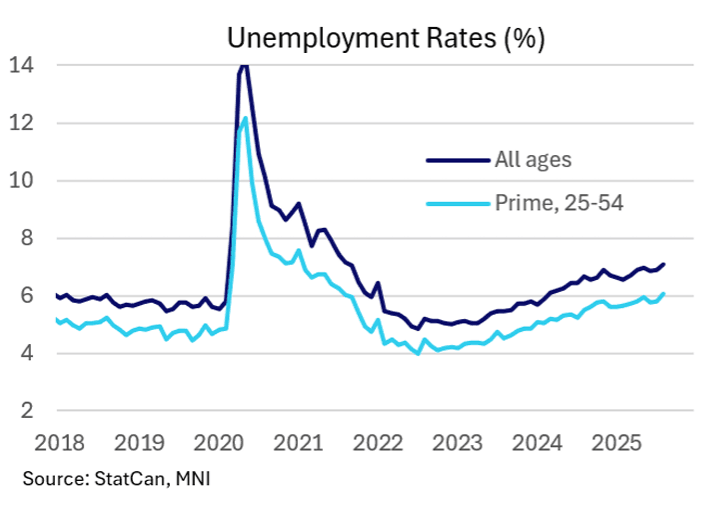MNI INTERVIEW: Job Losses To Rise Even With BOC Cut-Union Boss

Unemployment will keep rising from the highest in a decade even with the Bank of Canada returning to interest rate cuts, so the next federal budget must cushion damage from the U.S. trade war, the head of the country's biggest union group told MNI.
“We need more than just a rate cut in order to actually stimulate the economy to create those jobs and to safeguard the jobs,” said Bea Bruske of the Canadian Labour Congress, which represents three million of the country's 21 million workers, in an interview.
“I’m very worried that the trade impacts will really be felt this fall when employers are working off the order books and there’s no new orders coming in. And so we’re going to be seeing a continuing spike in unemployment."
The jobless rate has climbed from 6.6% in January to 7.1% in August and that's the highest in almost a decade excluding the pandemic. Bank of Canada Governor Tiff Macklem cut the policy rate 25bps to 2.5% Wednesday and the decision said hiring weakness has spread beyond industries like autos and steel bearing the brunt of U.S. tariffs. Before the trade war began U.S. exports accounted for about one in 10 jobs.
Weakness is intensifying from sluggish hiring to layoffs, Bruske said. “I absolutely expect to see more layoffs happening. We are hearing this from our union partners" based on talks with employers, she said.
NEED TO DO MORE
“We will see unemployment rising. When we see Windsor and Oshawa at double-digit unemployment numbers already, when we see youth unemployment spiking to almost 15%, that is an indication that we need to do more,” she said. Windsor and Oshawa are home to major auto assembly lines.
Governor Macklem said that while “we’re not expecting a recession” growth of about 1% in the second half of this year won't feel good to many Canadians. He declined to repeat guidance about possibly lowering rates again and said fiscal policy is better at shoring up specific industries.
Finance Minister Francois-Philippe Champagne says his Nov. 4 budget will curb program spending to free up cash for "generational investment" making Canada more resilient against U.S. trade disruptions. That approach will hurt the job market because it suggests reductions of perhaps 10,000 public service posts and spending on other support programs by as much as 15%, Bruske says. (See: MNI: Carney Deficits Are Bulwark Against Big Macklem BOC Cuts)
The government “can’t cut our way” out of the situation, she said. “Fiscal action from the government is clearly needed, what I’m very concerned about is that this government is talking about cuts to public service.”
